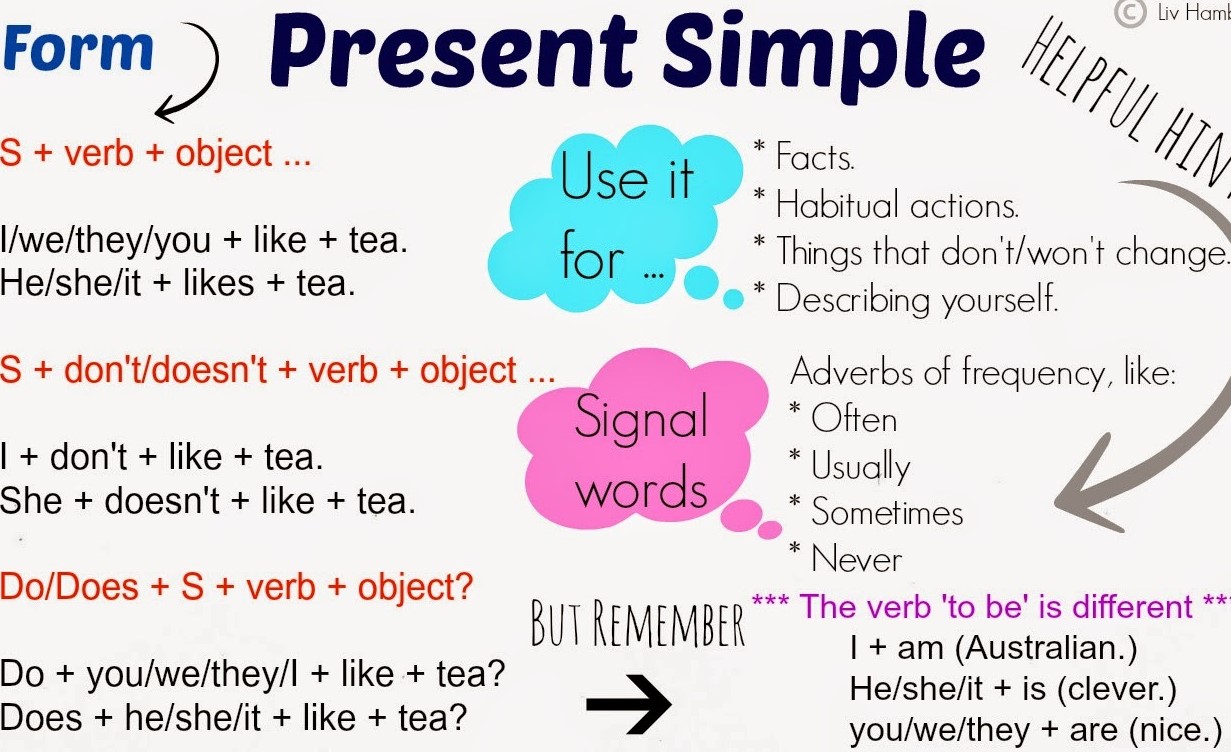presente simple
EL "SIMPLE PRESENT" SE UTILIZA:
- Para expresar hábitos y rutinas, hechos generales, acciones repetidas o situaciones, emociones y deseos permanentes:
I smoke (hábito); I work in London (permanencia); London is a large city (hecho general)
- Para dar instrucciones o indicaciones:
You walk for two hundred meters, then you turn left.
- Para hablar de eventos programados, presentes o futuros:
Your exam starts at 09.00.
- Para referirse al futuro, detrás de algunas conjunciones: after, when, before, as soon as, until:
He'll give it to you when you come next Saturday.
I smoke (hábito); I work in London (permanencia); London is a large city (hecho general)
You walk for two hundred meters, then you turn left.
Your exam starts at 09.00.
He'll give it to you when you come next Saturday.
FORMACIÓN DEL "SIMPLE PRESENT": TO THINK
| Afirmativa | Interrogativa | Negativa |
|---|---|---|
| I think | Do I think? | I do not think |
| You think | Do you think? | You do not think |
| He thinks | Does he think? | He does not think |
| She thinks | Does she think? | She does not think |
| It thinks | Does it think? | It does not think |
| We think | Do we think? | We do not think. |
| They think | Do they think? | They do not think. |
NOTAS SOBRE LA TERCERA PERSONA DEL SINGULAR DEL "SIMPLE PRESENT"
- En la tercera persona del singular, el verbo siempre termina en -s:
he wants, she needs, he gives, she thinks. - Para las formas negativa e interrogativa, se emplea DOES (= tercera persona del auxiliar 'DO') + el infinitivo del verbo.
He wants ice cream. Does he want strawberry? He does not want vanilla. - Verbos que terminan en -y : en la tercera persona del singular, se cambia la -y por -ies:
fly --> flies, cry --> cries
Excepción: cuando una vocal precede a la -y:
play --> plays, pray --> prays - Añadimos -es a los verbos que terminan en:-ss, -x, -sh, -ch:
he passes, she catches, he fixes, it pushes
Ejercicios
Escribe los verbos en la forma correcta de present simple.
Forma oraciones negativas.
Forma oraciones interrogativas con los elementos entre paréntesis.

Ejemplos:
- She reads the newspaper every day. (Ella lee el periódico cada día)
- We come to school by bus. (Nosotros vamos a la escuela en autobús)
- You work very hard. (Tú trabajas muy duro)
- She likes to sit in the sun. (A ella le gusta sentarse en el sol)
- We play in the park every day. (Nosotros jugamos en el parque cada día)
- He watches his son in the park. (Él observa a su hijo en el parque)
- We always try to arrive on time. (Nosotros siempre tratamos de llegar a tiempo)
- He always walks to school. (Él siempre camina para ir a la escuela)
- She does the work of two people. (Ella hace el trabajo de dos personas)
- The dog chases the cat all around the house. (El perro persigue al gato por toda la casa)
- Mr. Green works with my uncle. (El Sr. Green trabaja con mi tío)
- They always play tennis on Sundays. (Ellos siempre juegan tenis los domingos)
- He studies for his English class. (Él estudia para su clase de inglés)
- We eat together every day. (Nosotros comemos juntos todos los días)
- She attends church every day. (Ella va a la iglesia todos los días)
- I speak several foreign languages. (Yo hablo varias lenguas extranjeras)
- She eats in the cafeteria every day. (Ella come en la cafetería todos los días)
- She goes there twice a week. (Ella va allí dos veces a la semana)
- He teaches mathematics. (Él enseña matemáticas)
- We go to the movies every weekend. (Nosotros vamos al cine cada fin de semana)
- She plays the piano every afternoon. (Ella toca el piano cada tarde)
- She kisses me every morning. (Ella me besa cada mañana)
- You watch television every night. (Tú ves televisión todas las noches)
- He carries the books in a briefcase. (Él lleva los libros en un maletín)
- He enjoys his English class. (Él disfruta su clase de inglés)
- The bus stops at the corner. (El autobús se detiene en la esquina)
- She wants to learn French. (Ella quiere aprender francés)
- He speaks German. (Él habla alemán)
- She wishes to learn Italian. (Ella desea aprender italiano)
- The plane leaves from the airport at 8 o’clock. (El avión sale del aeropuerto a las a 8)
- I drive to work every morning. (Yo conduzco al trabajo todas las mañanas)
- He works in the third floor. (Él trabaja en el tercer piso)
- You always come to class late. (Tú siempre llegas tarde a la clase)
- He lives in Boston. (Él vive en Boston)
- I understand everything in the book. (Yo entiendo todo en el libro)
- She wants to visit London. (Ella quiere visitar Londres)
- He plays in the park every afternoon. (Él juega en el parque todas las tardes)
- I go to class twice a week. (Voy a clase dos veces a la semana)
- He does a lot favors to Kelly. (Él hace muchos favores Kelly)

Comentarios
Publicar un comentario